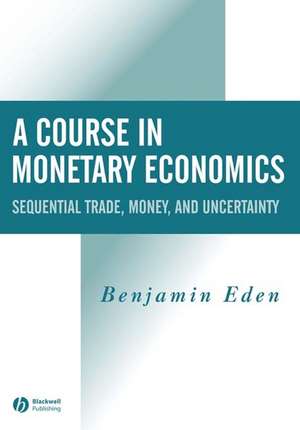A Course in Monetary Economics – Sequential Trade, Money, and Uncertainity
Autor B Edenen Limba Engleză Paperback – 5 aug 2004
The inventive analysis explores an extensive range of topics including the optimum quantity of money, optimal monetary and fiscal policy, and uncertain and sequential trade models. Additionally, the text contains a simple general equilibrium version of Lucas (1972) confusion hypothesis, and presents and synthesizes the results of recent empirical work. The text is rooted in the author's years of teaching and research, and will be highly suitable for monetary economics courses at both the upper-level undergraduate and graduate levels.
Preț: 355.59 lei
Preț vechi: 494.84 lei
-28% Nou
Puncte Express: 533
Preț estimativ în valută:
68.05€ • 70.96$ • 56.56£
68.05€ • 70.96$ • 56.56£
Carte indisponibilă temporar
Doresc să fiu notificat când acest titlu va fi disponibil:
Se trimite...
Preluare comenzi: 021 569.72.76
Specificații
ISBN-13: 9780631215660
ISBN-10: 0631215662
Pagini: 424
Dimensiuni: 176 x 247 x 24 mm
Greutate: 0.76 kg
Ediția:New.
Editura: Wiley
Locul publicării:Chichester, United Kingdom
ISBN-10: 0631215662
Pagini: 424
Dimensiuni: 176 x 247 x 24 mm
Greutate: 0.76 kg
Ediția:New.
Editura: Wiley
Locul publicării:Chichester, United Kingdom
Public țintă
Advanced undergraduate and graduate students in macroeconomics and monetary economics courses.Notă biografică
Benjamin Eden is a Professor of Economics at Vanderbilt University and the University of Haifa in Israel. He has published articles in numerous academic journals, including The Journal of Political Economy, The Quarterly Journal of Economics, and The American Economic Review. Professor Eden served for many years as a consultant to the Bank of Israel, and has taught monetary economics at various schools including Carnegie Mellon University, UCLA, the University of Iowa and the University of Chicago.
Descriere
Gives an introduction to the advanced topics in monetary economics. Accessible to students who have mastered the diagrammatic tools of economics, this title discusses real issues with a variety of modeling alternatives, allowing for a direct comparison of the implications of the different models.
